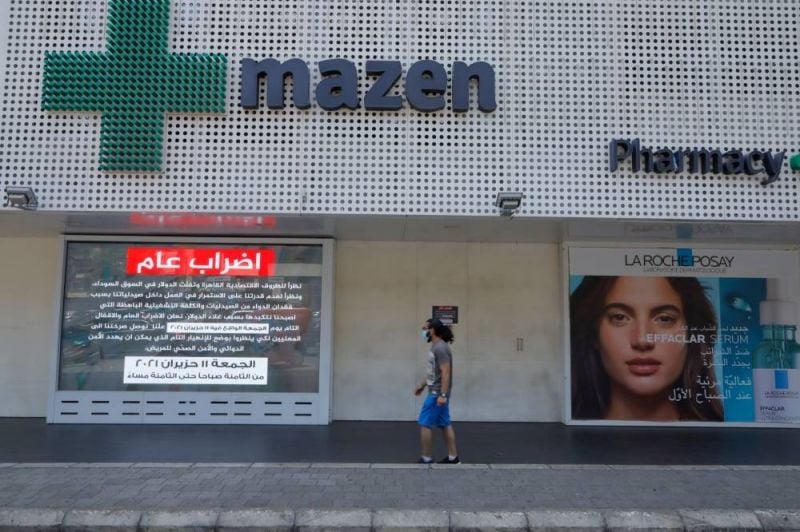
A shuttered pharmacy in Beirut's Corniche al-Mazraa area. (Credit: Marc Fayad)
BEIRUT — Pharmacies across Lebanon shut their doors on Friday as part of a nationwide protest against severe medicine shortages amid the worst economic crisis the country has experienced in decades.
About 90 percent of pharmacies in Lebanon participated in the strike, the head of the Lebanese Order of Pharmacists, Ghassan Amin, told L’Orient Today. The pharmacies are expected to remain closed over the weekend due to depleted medicine stocks.
“We’re getting only one or two deliveries of medicine from suppliers per month, and what we’re getting barely lasts us for one day before it’s gone," Mazen Bsat, the owner of Mazen Pharmacy in Corniche al-Mazraa, told L'Orient Today. Bsat said he had closed his pharmacy for the day but would consider opening over the weekend for customers who need medicine.
"We’re short on everything from Panadol to blood pressure medication. … The situation is getting worse every day."
Several pharmacists and doctors also held a demonstration outside of the Health Ministry in Bir Hassan on Friday, protesting the dire economic situation, which has severely impacted Lebanon's health sector.
Pharmacists and medical sector officials have said Lebanon’s central bank is delaying subsidized dollar payments to importers. Meanwhile, importers say they are unable to deliver their stock to residents or in some cases import medicine at all due to payment delays.
A central bank spokesperson denied the accusations and insisted that it was the Health Ministry’s responsibility to ensure medicine supplies are reaching pharmacists. The spokesperson also implied that the reason for drug shortages was due to smuggling, saying, “I’ve heard people say there is Lebanese medication in Kuwait, in Iraq, in Africa.”
Bsat said another issue pharmacists are facing is that profit margins are not sustainable. “The cost of medicine is still priced at LL1,500 to the dollar. … With the exchange rate the way it is now, we’re not making any profit,” he said.
The pharmacists' syndicate has been warning for months about the complete collapse of pharmacies if a solution to the drug shortages and profit margins is not found.
The Health Ministry could not be reached for comment.
However, caretaker Health Minister Hamad Hassan this past week signed a decision that will temporarily suspend the import of medicines that have at least two locally produced or generic alternatives, with limited exceptions.
Farrah, 34, said she has not been able to sleep at night from the anxiety of not being able to find her mother's blood pressure medicine. Speaking outside a closed pharmacy in Beirut’s Sioufi area, Farrah said she had been to 10 pharmacies on Friday — only two of which were open, but did not carry the medicine her mother needed, she said.
The authorities “are killing us," Farrah said. “They're killing us, and all we can do is watch.”
The central bank has maintained subsidies on medicine and other essential imports such as fuel and wheat since mid-2019, after Lebanon’s national currency began to deviate from its official peg of LL1,507.5 to the US dollar. The lira is currently trading at LL15,000 on the parallel market, edging closer to its lowest recorded value. Without the subsidies, medicine — or whatever is left of it on shelves — would become 10 times more expensive.
Lebanon’s health sector is among the worst affected by the devastating economic crisis. The private hospitals’ syndicate said on Thursday that hospitals would have to cut back on the number of patients admitted to hospitals as they are suffering from a severe shortage of lab reagents and supplies necessary for conducting laboratory tests. The syndicate also warned that hospitals may be forced to suspend kidney dialysis as of next week if they do not receive the supplies needed for the procedure.